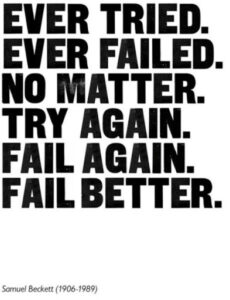8

There are two types of speakers:
Those that are nervous and those that are liars.
Mark Twain
Normal People Get Nervous
Most people will tell you the thought of making a speech makes them apprehensive. In fact, a poll by the National Communication Association found that only 24% of Americans are very comfortable giving a speech. You may be part of the 24%, or you may be like the rest of the population–uncomfortable at the thought of speaking in front of others. “According to most studies, people’s number one fear is public speaking. Number two is death. Death is number two. Does that sound right? This means to the average person, if you go to a funeral, you’re better off in the casket than doing the eulogy.” This quote from actor and comedian Jerry Seinfeld is funny because it is true. Researchers at the University of Nebraska conducted research to see if indeed students feared public speaking to that extent, so they surveyed 2,543 college students. The answer was “yes.” Public speaking ranked up there with death as the most common fear.
So, there you have it. If the thought of a speech makes you feel apprehensive, you are Normal. Normal people have all kinds of physical reactions when delivering a speech or even thinking about delivering a speech:
- Sweaty palms
- Accelerated heart rate
- A knotted stomach
- Dry mouth
- A lump in the throat
- Shortness of breath
Can you relate to any of these feelings? If you have any of these, you are not broken, you are not doomed for speech failure, quite the contrary. If you experience any of these, you are NORMAL.
At this point, you may be thinking pointing out your anxiety does not make you feel any better. Hang in there and keep reading. The goal of this chapter is threefold. It is to help you to realize that if you are anxious, apprehensive, or nervous about public speaking, then you are normal. It is to help you understand most people will have some physical responses to being anxious and it is how you think about these responses that make a difference. The biggest takeaway of all is for you to learn to be intentional with your thoughts and to change your mindset. In doing these things, you will prepare the path for future speaking success.
Time to Check Your Brain’s Check Engine Light
A man’s life
is what his thoughts
make of it.
Marcus Aurelius

There is a dashboard warning light in my car that lets me know something is wrong. When I take it to specialists, they plug in my car and “read the code” and they tell me exactly what the problem is. Let’s assume, your brain’s dashboard warning light is on and letting you know you may have a thinking problem. Let’s “read the code” to see what the issue is so we can fix it. You may have some faulty reasoning happening that is causing your speech anxiety. Time for a diagnostic. See how many of these relate to you.
All or Nothing Thinking:
All or nothing thinking assumes your self-meter has two options: all perfect or total failure. If you have ever given a speech and forgotten a part or misspoke a word and then declared the speech a disaster, you might have all or nothing thinking. A speech can be good- even great-and still contain speech mistakes. In fact, most speeches contain at least one mistake.
What’s the Fix for All Or Nothing Speaking? The fix for all or nothing thinking is to realize a perfect speech rarely exists. A great speech is one that communicates an idea to an audience. If you do that, you have accomplished the goal. If you mess up, or should I say when you mess up (because normal people make mistakes), then all is not lost. Recognize that the speech can be good and contain mistakes. You might say, “Overall the speech was great, I just wish I would have had a stronger ending. I will write it out next time.”
Overgeneralization:
Overgeneralization is the belief that a single failure is a universal sign of failure. If you are on a diet and you eat a cookie and then declare yourself a diet failure, you have overgeneralized. If you have a failure, it doesn’t mean you are a failure. If you have ever had a less than perfect speech moment, and then declared yourself a bad speaker, you have overgeneralized.
What’s the Fix for Overgeneralization? The fix is to recognize that one mistake does not make you a mistake. One failure, does not make you a failure. If you make a mistake, recognize it and make a plan to correct it in the future. The most important thing of all is to realize you are not defined as a failure because you made a mistake.
Fortune Telling:
Have you ever told yourself, “I know this is going to be a disaster?” If you predict your speech will go badly, then you have a fortune-telling problem. The more you fortune tell your speech will be a disaster, the more you undermine your own success. By fortune-telling (also known as self-fulfilling prophecy), you are wishing you will fail and then you will make your own negative predictions come true. Some people even delight in their own misfortune, “See, I told you I wasn’t cut out for public speaking.”
What’s the Fix for Fortune Telling? The fix to the fortunetelling problem is to take control and to stop. Predicting your own failure is just your own way of not trying. If you want to predict something, predict that if you practice, you will get better. If you focus on the needs of the audience, you will connect with them. If you do vocal exercises, you will strengthen your voice. Throw the darn crystal ball away, it was negative, unreliable, and you have outgrown it now.
Reality Check
At one time or another, most of us have gotten caught up in our failures or we have created scenarios in our head about the terrible things that may happen. It is just plain silly the way we torture ourselves. Most of us get worked up and miss out on sleep worrying about things that never even happen. Sometimes you just have to have a reality check.
So, what if you say the wrong word and they laugh….
Will they fire you—probably not.
Will they walk out—unlikely.
Will they hate you—not likely
Will your face turn red—maybe, but so what?
Is it really that awful? ——no
One professional speaker commented no matter what happens in a speech that she can turn it into something good. She suggests if everyone walks out on her, she can still use that. Next time I speak, I can say, “Last time I gave this talk the whole room walked out on me.”
Change Takes Effort
Whether you are a seasoned speaker or just getting started, it is important to realize everyone’s mind and motivation need a tune-up from time to time. It is difficult to break out of faulty patterns of thinking and it is not enough to just recognize it, you have to do something about it. Motivational speaker, Mel Robbins, illustrates this in a talk to executives. After reminding them that they came to the conference to network and to make new connections, she asks each of them to raise a hand if they sat by someone they already know. Most people laughed and raised their hands because they know they are supposed to network and yet most of them are playing it safe and sitting with friends. They, like us, were motivated to change, and yet they fell back on old patterns of behavior. As a conference activity, Robbins then proceeded to make them change seats and sit by someone new. They looked uncomfortable, grumbled a bit, and then changed seats. She reminded them we want to change, but change is hard and change is uncomfortable.
It is one thing to be motivated to think about change and it is another thing to be motivated to actually make the change. Making the change causes discomfort and leads to resistance, even if you are the one telling yourself the do it. Change is uncomfortable, but growth is worth it.
What’s the point? The point is you likely recognize that there are areas you need to work on. You likely already know what you need to do. You are already motivated to think about improving (that is why you are reading this book or taking a speaking class). It is not enough to want to change, you have to act on it. To do the next step, you must recognize that change causes discomfort. You are going to have to be vigilant to begin making those changes. Change is uncomfortable, make a plan, and stick to it.
Choose Which Self to Wear to Your Speech
 In the morning, I go into my closet and I look at all the clothes that I have to wear. I pick out which ones to put on for the day. I decide whether to dress like casual Lynn or professional Lynn. I make a decision on how to dress each day. In the same way, I decide which self to wear each day. I decide who to be each day. One of the most powerful things I learned about identity is that I don’t have one identity, I have many to pick from. Just like picking which outfit to wear for the day, I pick which “me” to be for the day.
In the morning, I go into my closet and I look at all the clothes that I have to wear. I pick out which ones to put on for the day. I decide whether to dress like casual Lynn or professional Lynn. I make a decision on how to dress each day. In the same way, I decide which self to wear each day. I decide who to be each day. One of the most powerful things I learned about identity is that I don’t have one identity, I have many to pick from. Just like picking which outfit to wear for the day, I pick which “me” to be for the day.
Think about the “self-clothes” you wear every day. If you are like me, there are times when you have felt unsure of yourself, maybe you lowered your eyes when people looked at you, maybe you talked in a powerless voice–on that day, you were wearing your shy self. On a different day, you felt like the expert, you were able to tell people how to accomplish a task, and you used your assertive voice–on that day, you were wearing your powerful self. Which was the real you? They both were. The people around you, the situation you were in, your mood at the moment, all contributed to which self you brought out for the day.
This is also true for which speaker you will be. You make the decision about which self you bring to your speech. You can bring the brave, outspoken “you” that has great things to say or you can bring the “you” that decides to play small.
A lot of growth can happen when you learn you are not an attribute, but rather you act out an attribute. You are not shy, you act shy. You are not bold, you act boldly. You are not nervous, you act nervous. Once you realize you are not going against your biology or against your personality to be a powerful, confident speaker, then you can give yourself permission to wear a powerful self to your speech. That “power self” outfit will look good on you, so try it on!
Consider This
I often have students play a game where they stand up in groups and each group talks at the exact same time as the other group with the goal of competing for the audience’s attention. In this game, students wave their arms, make direct eye contact, and raise their voices. They laugh and they have fun. I do this to let them know that they can speak loudly, use gestures, and have fun in front of an audience. I remind them they have just demonstrated to me they are capable of expressive movement and dynamic voice projection. Later when they tell me, they “just can’t project their voice” or they “just aren’t a person who gestures,” I remind them of the exercise where they demonstrated to me they can do both. I let them know they are capable of it; sometimes they decide to do it and other times they decide not to do it but they must own the fact that it is a choice they made.
Even after this activity, an occasional student will try to tell me, “I can’t project my voice” or “I’m just not assertive.” I never argue, I ask them if they have siblings. If they answer, “yes,” I ask them if they have ever yelled at their sibling to get out of their stuff. They usually laugh and say, “Oh, yes.” I then ask them to tell me of places they feel comfortable, and they act assertively. They tell me of a club they are in, a friend pack they hang out with, or a role where they feel confident. I remind them that clearly, they know how to project their voice because they have done it before. Clearly, they know how to be assertive because they have been assertive before. I remind them they know how to talk to others and be confident because they have acted confidently before. They have the ability; they just choose when to use that ability.
Now, I want you to think of a time you have chosen to define yourself as weak, shy, or unassertive. I want you to ask yourself why did you decide that for yourself? Think of at least three settings where you brought your “big self” to the situation. Think about a time, you have projected your voice. Think about a time you felt the power of your own words. You know you have the ability, what causes you to not want to bring it out?
We All Feel Like Imposters
Feel powerless or insecure? You are not alone. When interviewed, top executives, college professors, leaders of all kinds admit they often feel powerless. They often feel like they don’t belong, they aren’t smart enough, they are not good enough, and they don’t speak clearly enough. And yet, they put on their assertive selves and act the part until they begin to fully feel the part. They decide just because they have feelings of smallness does not mean they should act small. They have the choice not to act on the powerlessness they feel. In fact, for most, it pushes them to try harder. These leaders decide even if they sometimes feel like an impostor, they can still act the part and be powerful. They can put on their “big self” and so can you.
What’s the point? You decide how you are going to act in a speech. You control which you to wear for the day, you control whether you act powerful, and you control whether you bring your “big self” to the presentation. I hope you decide to try on the powerful you. You owe it to yourself to see what you can do. You might just decide it is a good fit.
Who Will You Decide to Be?
| Don’t Do This | Do This Instead |
| Awfulizing Me
“What if I mess up? I always mess things up.” |
Overcomer Me
“I’m tough and can take on any challenge.” “It may not be easy, but I can do it.” |
| Insecure Me
“What if they don’t like me? They will hate me.” |
Confident Me
“I’ve got this because I have practiced and I know my stuff.”
|
| Hater Me
“Speech is stupid. I can’t believe I have to do this.” |
Powerful Me
“I’ve got great things to say, and I know it will cause them to think.”
|
| Downer Me
“I know I’m going to mess it all up. I always do. Why even try? |
Optimistic Me
“I may not be perfect, but I have something important to share.” |
You are capable of being all these.
Which one will you pick on your speech day?
What’s the Worst That Could Happen?
Sometimes, you can create fears to keep yourself from fully trying. If that happens, the best thing you can do with your fear is to take it to its logical absurdity.
What if I mess up?
So what?
People will laugh at me!
So what?
They won’t like me!
So what?
No one will be my friend.
Really, So what?
If no one in the class will be my friend, then I will be lonely.
So what?
No one will talk to me outside of class and I will be so lonesome I will drop out of college.
Are you sure? So, then what?
I will drop out of college, never have good relationships which means I will never get a job.
So what?
I will be homeless living under a bridge with a stray dog.
All that because you messed up on your speech in college. Really?
As I said, we take it to its absurdity. So, what if you mess up. Usually, the worst that can happen is you get a little embarrassed at the time and have a good story to tell for a lifetime.
Use the A.W.A.R.E Method to Beat Anxiety
If you feel anxiety is getting too much, do what nurses are trained to do and be aware. The A.W.A.R.E. method can help:
Accept that you feel anxious. Fighting it will not take away the anxiety.
Watch your anxiety. What changes are you noticing in your body, your thoughts, and your perception?
Act normal. Breath normally and act as if you feel confident and calm. This will pass and your anxiety will fade away.
Repeat the three steps above until your anxiety reduces to an acceptable level.
Expect the best. Invest your time and energy in what can help you, don’t worry about what might go wrong.
Day-Calder, M. (2017). Conquer your fear of public speaking. Nursing Standard (2014+), 32(3), 37.
I was once given the advice to think of emotions like a river. Emotions flow into us and will flow through us and out of us as long as we don’t try to dam them up.
Know That They Can’t Tell How Nervous You Are
You know the feeling that goes through your mind: “I’m so nervous. I bet everyone can tell”? Well, guess what—they can’t. At least this is what research suggests. If you have felt like people could peer into your very soul and see your insecurity, you are not alone. The illusion of transparency is the tendency for people to overestimate the degree to which their personal mental state is known by others. Because our emotions feel so strong to us, we are sure that they “leak out” and that everyone can tell just how we feel. When researchers put it to the test, they found that observers just are not very good at picking up on a speaker’s emotional state. The speakers thought the audience could sense their insecurity and could see their hands shaking and could hear their voice shaking, but the audience noticed very little or not at all. Researchers in an article titled, The Illusion of Transparency and the Alleviation of Speech Anxiety, suggest:
What’s inside of you typically manifests itself too subtly to be detected by others. You should just relax and try to do your best. Know that if you become nervous, you’ll probably be the only one to know.
The researchers found simply telling people the audience could not see through them made them less anxious as speakers. The bottom line is this: speaker anxiety is not very accurately detected by audiences. Simply knowing this can help set you free. Do not worry, they can’t see through you. Now you know, you can let it go.
Know That You Are Likely Misinterpreting Cues
“I saw that guy in the back make an angry face, I know he hated my speech.” It is easy when you are nervous to look at the audience and the looks on their faces as hostile. I once got a note from a student who told me he thought I hated his speeches because I gave him mean looks. I thought about it long and hard because I really liked the student, and I really liked his speeches. Maybe it was because I had been wearing the wrong glasses and squinted a little, maybe it was because the room and windows created weird light streaks that made it hard to see his slides, maybe it was because I had a headache that day, or maybe it was because I just make weird facial expressions (my kids tell me this one is true). The problem is I liked his speeches and he thought I hated them.
I found an article in the Psychophysiology Journal that might explain what happened. In this study, researchers told participants that they would have to give a speech. While waiting for their turn to give the speech, participants looked at a series of facial expressions and were tested by an electroencephalogram. The researchers found that participants who thought they were fixing to give a speech were more likely to judge the faces they saw as angry.
Think about it. This implies that when you are ready to give a speech, you may see neutral faces as angry. The famous lawyer Gerry Spence wrote about something similar. Every time he spoke, he noticed one of the jurors would look stern and cross his arms across his chest. He just knew that juror was really opposed to his message. He was shocked when all the jurors voted in favor of his client. How could that be? What about the man with his arms crossed? Later, the juror said, his crossed arms weren’t in opposition, he just had a big belly, and it is a nice place to rest his arms. Be aware of the tendency to interpret other’s nonverbals in a negative way.
You do not know what is going on in the minds of your audience so always assume the best.
Realize That Stress Can Be Helpful
Health psychologist Kelly McGonigal shares her surprising revelation-stress can be a good thing. In her TED Talk, How to Make Stress Your Friend, she reveals that when it comes to stress, a rapid heartbeat and fast breathing are not the problem. The problem is what we believe those physical reactions mean. It is how we label the stress that matters most. Think about it. Your heart pounds and your breath quickens in moments of joy. Your heart pounds and your breath quickens before acts of great courage. Your heart pounds and your breath quickens in anticipation of special events. A pounding heart and quickened breath can be a good thing. When you interpret those physical symptoms as something good, it opens your blood vessels and sends extra oxygen to your brain and you feel energized and prepared. When you label that fast heartbeat and rapid breathing as helpful, you feel more confident, less anxious, and less stressed out. McGonigal suggests it is when you interpret these reactions as bad that it constricts your blood vessels leading to health issues.
Football players and other athletes often do things to get pumped before running out on the field. These players believe an adrenaline rush means they are going to play well. They think of adrenaline as a gift that means they are charged up. They believe the adrenaline will help them run faster and be more alert. If you are a speaker and you experience an adrenaline rush, be like these players and think of it as a sign your body is awake, alert, and ready to go. Just remember that most people experience some version of butterflies before they speak. If you are nervous, you are normal. Good speakers channel energy into making a good speech. Good speakers know you do not want to get rid of the butterflies, you just want them to fly in formation.
So, what does that mean for you? It means your pounding heart and heavy breathing have prepared you for action.
Watch the full video on stress here.
The Surprising Side Effect of Stress
Ready for the bonus feature?
Now you have watched the video, you know there is another great side effect to stress–you become more social. McGonigal suggests that when you are stressed, not only do you release adrenaline, but you also release oxytocin. It is the release of oxytocin that makes you want to spend time encouraging people and being around people. All these years, I have joked that my public speaking students have bonded so fiercely because they bonded through pain, and now I know it is literally true. Since they were together in times of high excitement during speeches, they felt closer and more bonded (much like a sports team).
McGonigal also suggests that an oxytocin reaction is a form of self-healing. When you have an oxytocin reaction, you tend to want to seek and give support. All of this wonderful oxytocin protects, regenerates, and strengthens your heart.
What does this mean for you? It means if you feel anxious about an upcoming speech, call a friend or get a hug from your mom. That feeling you have makes you want to tell someone how you feel is your body’s way of helping you to be successful and healthy. Your body knows what it needs, it doesn’t need to run from speech, it needs to connect with people who care about you. In your anxiety, you should encourage others. In doing so, you help yourself along the way. Your body knows what to do- listen.
Let Fear Propel You
It is normal to have physical reactions when thinking about public speaking and it is how we frame these feelings that makes all the difference. Many famous speakers tell of wrestling with fear and Gerry Spence, lawyer and author of How to Argue and Win Every Time and Win Your Case, is one of them. I will let him describe his battle in his own words.
“In the courtroom, I sometimes carry on a silent conversation with myself about my fear, while the jurors look on wondering, as they must, what occupies this strange man who stands silently before them looking down at his feet. My conversation with myself most often sounds like this:
“How are you feeling, Gerry?” I ask.
“The jury is watching, waiting for me to begin my argument,” I reply. “I can’t just stand here saying nothing.”
“I asked you, how are you feeling?”
“You know how I feel.
“What is the feeling?”
“You know what the feeling is.”
“Are you afraid to say it?”
“All right. I’m afraid.”
“Well, you should be. Big stakes. The prosecutor wants to destroy your client. He wants to destroy you.”
“I don’t want to think about it. Not now. Not standing here.”
It’s all right to be afraid. You should be afraid. Go ahead. Feel it.
“But the jury’s watching.”
“They can wait a few seconds more.
Fear is energy.
If you feel your fear, you can also feel its power, and you can change its power to your power.”Suddenly, I look up at the waiting jury. I hear myself address them in a clear, quiet voice, “Ladies and gentlemen of the jury.” Suddenly, I am vaguely aware that something is happening to my fear. I have looked it in the eye. I have stared it down. It retreats like a whimpering cur that is now afraid to face me! The pain of it recedes. I feel a new power well up. And my argument begins…
I have learned not to be ashamed of my fear, but to embrace it. One cannot be brave without it, for is not our bravery merely the facing of our fear?”
Can you see a pattern emerge with these things? Fear is not the problem, it is how we allow fear to cripple us or give us the power that matters.

Believe That with Practice, You Can Improve
When you think about speaking are you tempted to believe, “Some people are just born good speakers” or “I just wasn’t made for this public speaking stuff.” If that is you, you may have what Stanford researcher Carol Dweck calls a “fixed mindset.” It does not have to be that way, Dweck found when people left their options open and believed that they could improve, they did. One way to keep your mind open is to add the word “yet” to the end of the sentence. It’s easy. Let’s try it: “I haven’t mastered this…yet. I haven’t learned to gesture without thinking about it…yet.”
Another way you can help yourself have a growth mindset is to pick a few growth mindset quotes and place them where you can see them every day. Look at them, read them out loud, and think about where you want to be. Let a growth mindset become your new habit.
Here are a few of my favorite quotes:
- It’s not always about being the best. It’s about being better than you were yesterday. –Jigoro Kano
- No matter how many mistakes you make or how slow your progress, you are still way ahead of everyone who isn’t trying. –Tony Robbins
- Life is 10% what happens to you and 90% how you react to it. –Charles Swindoll
- Courage is like a muscle. We strengthen it when we use it. –Ruth Gordon
- Sometimes what we call “failure” is really just that necessary struggle called learning.–Louis Armstrong
- May your choices reflect your hopes, not your fears. –Nelson Mandela
- A comfort zone is a beautiful place but nothing ever grows there. –John Assaraf
- You won’t always be motivated; you will have to learn to be disciplined.–Author unknown
- Doubt kills more dreams than failure ever will. –Suzy Kassem
- You have not failed unless you have quit trying. –Gordon B. Hinckley
 Change the Way You Think About Things
Change the Way You Think About Things
Whatever you do, do not think about the pink elephant. Stop!
Don’t think about the pink elephant with cute pink ears. Do not think about an elephant with a hot pink tail. How are you doing? If you are like most people, not too well.
Now, try this. Think about a green monkey. Go ahead. Picture its green curly tail and its fluffy green fur. So, here’s the question, when you were thinking of the green monkey, did your image of the pink elephant go away? For most people, it did.
What’s the point? The point is before a speech, most people tell themselves, “I won’t be nervous, I won’t be nervous, I won’t think of the pink elephant.” Do you see where I’m headed with all of this? Telling yourself not to be nervous rarely helps. The more you say, “I won’t be nervous,” the more you feel nervous.
So how do you stop thinking of the pink elephant? By thinking of the green monkey of course. Apply this to speaking. Instead of saying, “I won’t be nervous” or “I won’t forget what to say,” say things like, “This speech is going to be great! I can do this.” or “My audience will love the part where I…” Speech teacher, Donn King calls this harnessing your green monkey, and researchers call it cognitive restructuring. You will restructure the way you think about things.
Conquer your fear with positive self-talk. Tell yourself you will be relaxed, articulate, and confident…and you will be.
Cognitive Restructuring
|
|
| Don’t Say (Pink Elephant) |
Do Say (Green Monkey) |
| • I’m afraid my voice will crack.
• I’ll mess up and say the wrong words. • I’m so nervous. • I hate doing speeches. |
|
I often use the green monkey analogy when making presentations to groups. I say, “When you think about the green monkey, the pink elephant goes away. Except for some of you, some of you imagine the green monkey riding the pink elephant (the audience always laughs). You are the special ones who do things differently.” I said this in a special presentation to Panamanian Engineering students and their director Michael Rau sent me a picture and a note that said, “This is me.”

This made my day and I keep it on my desk as a reminder–we all do things differently. Sometimes the green monkey (positive thinking) can erase the pink elephant (negative self-talk). For others, the self-doubt may still be there but the monkey (positive thinking) eventually learns to drive the fear to work towards great things. Each of us finds different ways to believe in ourselves and harness our fears. Each of us is working to find our way, so find what works for you.
Focus On What You Want More Of
If you think, I am energized.
If you think, I am going to speak confidently.
If you think, I am going to share important things and they will want to listen
Then, you’ll get more of those feelings.
Think about things you actually want to increase.
Plan on Recovering Well
I Hope You Mess Up At Least Once—I Really Mean It!
I hope you mess up so you can get it over your unrealistic expectation of perfection.
I love hearing stories of how people messed up in speeches. My favorite one is of a mega-church pastor who attempted to say ‘the church is a living organism’ but he accidentally said another much more embarrassing “O” word. Guess what? He is still preaching.
I love showing videos of where Obama says there are 52 states and I laugh at how Bush says “Americans are working to put food on their family.” Guess what? They still managed to get things done.
I love to see the video of where the local TV anchor’s tooth falls out during a broadcast. Guess what—he is still the anchor.
Being human and making mistakes makes you human; how you deal with those mistakes can make you more approachable. One of my first jobs was as a cashier at a convenience store. Whenever I made a mistake, I would lower my eyes and look ashamed and repeatedly tell the customer how sorry I was. One day, my boss came up to me and said I needed to find a better strategy for when I messed up. He said by repeatedly apologizing, I was making it a bigger deal than it was. The next time, I messed up, I looked at the customer and said, “This very special hamburger is only sixty-five dollars and twenty cents.” The customer laughed and made a remark about how it had better be a darn good burger. I assured him it was a great hamburger while I fixed my mistake. He left smiling.
What’s the point? The point is that mistakes will not kill you. Mistakes give you good stories to tell. I hope you mess up at least once so when you are sitting around with friends who are willing to listen to your stories that you can tell them of your most embarrassing speech blunder. I hope everyone can have a good laugh. And laughter after all…is good for you.
Besides, perfect people are boring. Robert Glover, psychotherapist, and author says, “In general people are not drawn to perfection in others. People are drawn to shared interests, shared problems, and an individual’s life energy. Humans connect with humans. Hiding one’s humanity and trying to project an image of perfection makes a person vague, slippery, lifeless, and interesting.”
Just remember the audience doesn’t expect perfection. They don’t judge that you made a mistake, but rather how you recover from it. When you do mess up, don’t make a big deal of it. Most of the time, you are better off not even mentioning it at all. If you are quick on your feet, you might say one or two funny words but then go on. You have great things to say, don’t let a little bump in the road slow you down. Practice your speech and plan on being perfect, but if that doesn’t work out, plan on recovering well. Try again. Fail better.

If you pretend you didn’t make a mistake,
chances are the audience won’t notice, and certainly won’t dwell on it.
Interrupting your speech by apologizing or panicking
will make your mistake more noticeable and will throw you off.
Jennifer Conner
University of Arkansas Speech Student
Realize the Audience is On Your Side
Chris Anderson of TED Talks gives the following wisdom:
Acknowledging nervousness can also create engagement. Showing your vulnerability, whether through nerves or tone of voice, is one of the most powerful ways to win over an audience, provided it is authentic. Susan Cain, who wrote a book about introverts and spoke at our 2012 conference, was terrified about giving her talk. You could feel her fragility onstage, and it created this dynamic where the audience was rooting for her—everybody wanted to hug her afterward. The fact that we knew she was fighting to keep herself up there made it beautiful, and it was the most popular talk that year.
I share this example for a couple of reasons. One, notice you can hear her nervousness and yet you get so carried away with her message you forget about it quickly. Two, many of you may think of yourself as an introvert who is just not the “public speaking” type, and yet, here she is speaking powerfully and giving examples of other introverts who speak powerfully.
Key Takeaways
Remember this!
- Most people get nervous at the thought of public speaking. If you are nervous, you are normal.
- It is not the physical reaction of stress that is the problem, it is how you think about it. Think of the adrenaline rush as excitement. The way you feel is your body getting you ready to succeed.
- You have permission to be powerful. Have a growth mindset and allow yourself to try.
- Decide what you have to say is more important than any discomfort you have.
- Focus on what the audience needs to hear. Move your focus from what the audience needs to hear more than your need you have to be comfortable.
- By now, you should have identified you have some ways of thinking that may be holding you back. You are armed with the knowledge that you can choose which self to bring to your speech. Now, it is time to try it out.
Please share your feedback, suggestions, corrections, and ideas.
I want to hear from you.
Do you have an activity to include?
Did you notice a typo that I should correct?
Are you planning to use this as a resource and do you want me to know about it?
Do you want to tell me something that really helped you?
References
Anderson, C. (2016). TED talks: The official TED guide to public speaking. Mariner.
Anderson, C. (2013). How to give a killer presentation. Harvard Business Review. https://hbr.org/2013/06/how-to-give-a-killer-presentation
Ayers, J. (1995). Comparing self-constructed visualization scripts with a guided visualization. Communication Reports 8, 193-199. https://doi.org/10.1080/08934219509367626
Ayres, J & Hopf, T. (1992). Reducing speech anxiety and enhancing performance. Communication Reports 5(1), 1-10. https://doi.org/10.1080/08934219209367538
Behnke, R. R., Sawyer, C. R., & King, P. E. (1987). The communication of public speaking anxiety. Communication Education, 36(2), 138–141. https://doi.org/10.1080/03634528709378654
Bergland, C. (Jan. 2013). Cortisol: Why “the stress hormone” is public enemy number one. Psychology Today. https://www.psychologytoday.com/blog/the-athletes- way/201301/cortisol-why-the-stress-hormone-is-public- enemy-no-1
Buchan, V. (1991). Make presentations with confidence. Barron’s Educational Series.
Bulard & Carrol (1993). Communicating from the inside out. Kendall Hunt.
Cain, Susan. (2012). The Power of introverts. TED.com. [Video]. YouTube. https://www.ted.com/talks/susan_cain_the_power_of_introverts Standard YouTube License.
Cuddy, A. Your Body Language Shapes Who You Are. TED.com. [Video]. YouTube. https://www.ted.com/talks/amy_cuddy_your_body_language_may_shape_who_you_are?language=en Standard YouTube License.
Day-Calder , M. (2017). Conquer your fear of public speaking. Nursing Standard, 32(3), 37. doi: 10.7748/ns.32.3.37.s42
Dominus, S. (2017). When the revolution came for Amy Cuddy. New York Times Magazine. https://www.nytimes.com/2017/10/18/magazine/when-the-revolution-came-for-amy-cuddy.html
Dweck, C. (2016). Mindset: The new psychology of success. Random House.
Dweck, C. (2014). The power of believing you can improve. [Video]. YouTube. https://www.ted.com/talks/carol_dweck_the_power_of_believing_that_you_can_improve?language=en Standard YouTube License.
Dwyer, K.K & Davidson, M.D (2012). Is public speaking really more feared than death? Communication Research Reports 29(2). DOI: 10.1080/08824096.2012.667772
King, D. (n.d). Managing speech anxiety. http://donnellking.com/
King, D. (n.d.) Managing stage fright. http://www.soapbox orations.com/squiggles/stagefright.htm.
McCluen, M. (1964). Understanding Media: The Extensions of Man. MIT Press.
McCroskey, J. C. (1977). Oral communication apprehension: A summary of recent theory and research. Human Communication Research, 4(1), 78-96. http://www.jamescmccroskey.com/publications/074.pdf
McGonigal, K. (2013). How to make stress your friend. [Video]. YouTube. https://www.ted.com/talks/kelly_mcgonigal_how_to_make_stress_your_friend?language=en. Ted.com. Standard YouTube License.
Osborn, Osborn, & Osborn (2012). Public speaking: Finding your voice. Allyn Bacon
Robbins, M. (2018). Stop Giving a Shit. [Video]. YouTube. https://www.youtube.com/watch?v=P_B6mJRpg-A Standard YouTube License.
Savitsky, K. & Gilovich, T. (2003). The illusion of transparency and the alleviation of speech anxiety. Journal of Experimental
Social Psychology, 39, 618-625. https://doi.org/10.1016/S0022-1031(03)00056-8
Snyder, K. (n.d). Controlling nerves.http://www.presentation-pointers.com
Stevanoni, E. & Salmon, K. (2005). Giving memory a hand: Instructing children to gesture enhances event recall. Journal of Nonverbal Behavior, 29(4). /DOI: 10.1007/s10919-005-7721-y
Toastmasters International. (n.d). 90 Tips. https://www.toastmasters.org/About/90th-Anniversary/90-Tips
Toastmasters. (2013). Managing fear. [Video]. YouTube. https://www.youtube.com/watch?v=d1u7THOudfw Standard YouTube Licence.
VanEdwards, V. (n.d.) Five secrets of a successful TED Talk. https://www.scienceofpeople.com/secrets-of-a-successful-ted-talk/
Weiser, M.J., Pauli, P., Reicherts, P., & Muhlberger, A. (2010). Don’t look at me in anger! Enhancing the processing of angry faces in anticipation of public speaking. Psychophysiology 47(2), 271-280. DOI: 10.1111/j.1469-8986.2009.00938.x
Wenner, M. (2009). Smile it could make you happier. Scientific American. https://www.scientificamerican.com/article/smile-it-could-make-you-happier/


